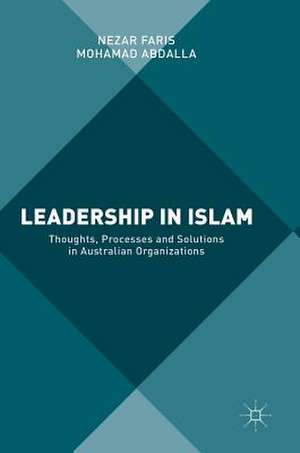Leadership in Islam: Thoughts, Processes and Solutions in Australian Organizations
Autor Nezar Faris, Mohamad Abdallaen Limba Engleză Hardback – 11 ian 2018
| Toate formatele și edițiile | Preț | Express |
|---|---|---|
| Paperback (1) | 578.55 lei 6-8 săpt. | |
| Springer International Publishing – 4 iun 2019 | 578.55 lei 6-8 săpt. | |
| Hardback (1) | 726.55 lei 6-8 săpt. | |
| Springer International Publishing – 11 ian 2018 | 726.55 lei 6-8 săpt. |
Preț: 726.55 lei
Preț vechi: 886.03 lei
-18% Nou
Puncte Express: 1090
Preț estimativ în valută:
139.04€ • 144.34$ • 115.94£
139.04€ • 144.34$ • 115.94£
Carte tipărită la comandă
Livrare economică 24 martie-07 aprilie
Preluare comenzi: 021 569.72.76
Specificații
ISBN-13: 9783319664408
ISBN-10: 3319664409
Pagini: 198
Ilustrații: IX, 207 p. 7 illus., 1 illus. in color.
Dimensiuni: 148 x 210 mm
Greutate: 0.41 kg
Ediția:1st ed. 2018
Editura: Springer International Publishing
Colecția Palgrave Macmillan
Locul publicării:Cham, Switzerland
ISBN-10: 3319664409
Pagini: 198
Ilustrații: IX, 207 p. 7 illus., 1 illus. in color.
Dimensiuni: 148 x 210 mm
Greutate: 0.41 kg
Ediția:1st ed. 2018
Editura: Springer International Publishing
Colecția Palgrave Macmillan
Locul publicării:Cham, Switzerland
Cuprins
Chapter 1: Introduction.- Chapter 2: Leadership in Islam based on primary sources.- Chapter 3: Overview of the Australian Muslim context.- Chapter 4: Australian Muslims’ perceptions of leadership.- Chapter 5: Leadership: Core problems.- Chapter 6: Problematic context.- Chapter 7: Reconciling Problems.- Chapter 8: Accommodating Complexity and Sense making.- Chapter 9: Embracing Basics: Internal & External.- Chapter 10: Conclusion.
Notă biografică
Nezar Faris is a Research Fellow at the Centre for Islamic Thought and Education (CITE) at the University of South Australia. Previously he was an affiliated Research fellow at the National Centre of Excellence for Islamic Studies (NCEIS) at Griffith University. Dr Faris’ work has appeared in Leadership Quarterly.
Mohamad Abdalla is the Founding Director of the Centre for Islamic Thought and Education, University of South Australia. One of Australia’s most prominent and respected Muslim leaders, he combines the roles of academic scholar, public intellectual, community leader and commentator. Professor Abdalla played a leading role in establishing Islamic studies as an academic area of study in Australia, and has held multiple academic posts.
Mohamad Abdalla is the Founding Director of the Centre for Islamic Thought and Education, University of South Australia. One of Australia’s most prominent and respected Muslim leaders, he combines the roles of academic scholar, public intellectual, community leader and commentator. Professor Abdalla played a leading role in establishing Islamic studies as an academic area of study in Australia, and has held multiple academic posts.
Textul de pe ultima copertă
This book examines the concept of leadership from within the Islamic worldview, exploring its meaning and various manifestations through textual evidence from the two primary sources of Islam, The Qur’an and hadith. Using this theoretical framework concurrent with contemporary leadership theory, the authors scrutinise the distinctive leadership dynamics of Islamic organisations within a minority-Muslim context and a focus on Australia. Drawing on empirical data gathered over four years, the nature of leadership and its processes within this unique context is examined. Leadership in Islam reconciles the problematic processes that exist within Muslim organisational context and offers a set of measures and strategies to improve leadership processes including enacting leadership, enacting following, accommodating complexity, sense making and embracing basics as the core processes. This book will be beneficial for anyone who seeks to understand the meaning of leadership in Islam, the wayIslamic organisations operate, and the way forward for improving leadership processes within an Australian/Western context.
Caracteristici
Engages with distinctive leadership dynamics within Islamic groups Contributes to leadership thinking in corporate and social policy Discusses leadership within an inter-cultural society
